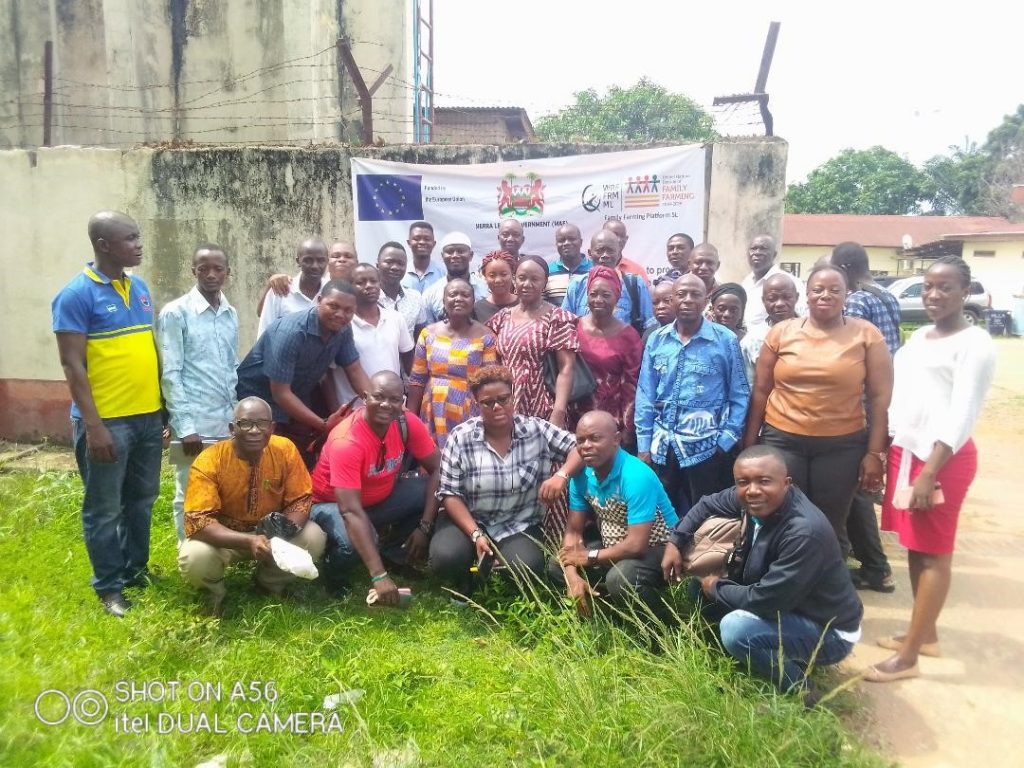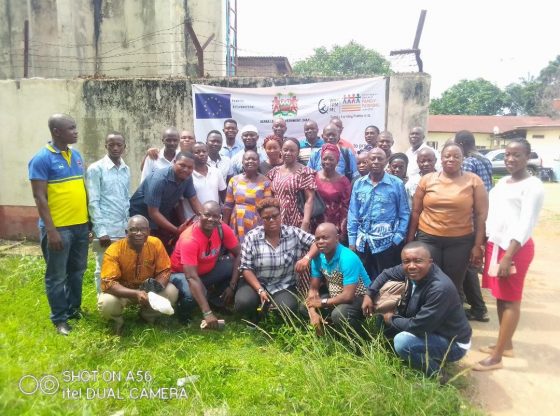The Sierra Leone Government, through the Ministry of Agriculture, Forestry and Food Security Family Farming Platform (FFP), with support from the European Union (EU) through the World Rural Forum and Food and Agriculture Organization of the United Nations (FAO), on Thursday 1st July 2021 ended its fourth regional consultations with various stakeholders on the validation of the National Action Plan for Family Farming.
The validation meeting took place at the conference room of the Sierra Leone Red Cross Society in Port Loko District.
Like in Port Loko District, stakeholders earlier unanimously validated the document in Bo, Makeni and Kenema.

Participants from the four regions included representatives of the Ministry of Agriculture, farmer cooperatives, women, youths, agri-businesses, Women in Agriculture, the Sierra Leone Agricultural Research Institute, Civil Society Organizations (CSOs) and the media.
The validation meetings were facilitated by the Consultant and National Coordinator of the FFP, Mr. Francis Webber and colleague, Dr. Joseph James Mbavai and the four District Agriculture Officers in Makeni, Bo, Kenema and Port Loko in their respective regional headquarter towns.
Among the resolutions, participants called for the creation and maintenance of community forests, that logging and mining have become rampant and are threats to the environment that have resulted to climate change and global warming, that Sierra Leone’s ecosystem has been depleted, that vulnerable groups like the physically-challenged and women should be given support and that farmers must have access to land and finance/loans.
Other resolutions are that farmers must keep to climate smart, that District Savings and Loans Associations must be increased with a central pool where farmers can contribute substantial amounts, that loans should only be given to productive and credit-worthy members, that less trained and educated people should not train and supervise those who are more educated, that government bureaucracy should be drastically reduced and that seeds and other agricultural inputs must reach farmers on time.
Participants also stressed the need for organic farming, condemned the use of agrochemicals that are dangerous to humans, that Farmer Field Schools are very important, that Family Farming promotes organic farming, that 98% of tractors and other farm machines are driven by men, that they want more women processors, marketers and agric-technicians and that the social and traditional media must be incorporated into the entire process.
They further highlighted that grassroots contributions are key in the process, that Agriculture Business Centers are politically manipulated and mismanaged and farming inputs squandered, that farming inputs should be supplied on time, that Farmer Based Organizations should be functional, that the right people should be elected into positions of trust and responsibility, that farming should be depolitized, that there is no National Food Security Policy as the one drafted since 2004 has not been enacted by Parliament. They also stressed the need for the leader of the Family Farming Platform to advocate for a review of such policy, so it can capture the interest of family farmers in Sierra Leone. They said a WhatsApp group should be created for continuous sensitization on the FFP for the next 10 years and that stakeholders want a quick impact and early entry point project.
The workshops were officially opened by the District Agriculture Officers (DAOs) in Makeni, Bo, Kenema and Port Loko respectively during which they revealed among other things that government has procured 400 tractors, power tillers and other agricultural machinery to actualize food security in the country adding that government would also build the capacity of farmers and that the tractors, power tillers and other farming inputs would now be managed by the private sector.
The DAOs also stressed that the regional meetings are very important and appealed to participants to be attentive and make salient inputs into the process.
In his welcome statement, the representative of FAO, Mr Ibrahim Bangura, the Focal Person for the FFP in the Food and Agriculture Organization (FAO) disclosed that the United Nations asked member countries to develop an Action Plan of the United Nations Decade of Family Farming, hired a National Consultant, Mr. Frank Webber through the Ministry of Agriculture and Forestry, which started a regional consultations in November and December 2020 to develop a draft of the NAP.
He also appealed to participants during the regional validation meetings to make salient inputs into the document to stand the test of time before it is presented to the Ministry of Agriculture for approval for which he pledged FAO support to the process enlightening that when approved the NAP would be a public document as it contains government priorities.
Mr. Bangura continued that the main objective of the UNDFF is to alleviate poverty, especially among women who make up between 60-70 % of family farmers in Sierra Leone as well as transform their lives to realize their full potentials underscoring that farming would now be based on family farming that would include fish ponds and animal husbandry and stressed that the document would speak for farmers reiterating that it would no longer be business as usual.
In his presentations, the National Coordinator and Focal Point of the NCFF/Family Farming Platform in Sierra Leone FFP-SL, Mr. Francis Webber, who also doubled as the National Consultant, affirmed that stakeholders want a rich document from the people revealing that although family farmers produce 80% of the food people consumed globally they are still very poor.
According to Mr. Webber, Sierra Leone has made progress in preparing its National Action Plan underlining that there was need to request for funding to the EU through the World Rural Form pointing out that the document would not be complete without the input of farmers that would make a lot of difference concluding that a committee would be setup to monitor the implementation of the National Action Plan on Family Farming with a Terms of Reference to be developed for those committees.
Highlights of the four regional meetings were the group work with specific action points relating to the Seven Pillars in the National Action Plan for Family Planning, presentations, general discussions on the entry points, implementation actions, setting up of the Technical, Women and Youth Committees and radio discussion programs in which callers asked pertinent questions.
The Technical Committees in the four regions are to raise funds, design projects and proffer professional advice for quick impact.
Some of the seven pillars in the National Action Plan are developing an enabling policy environment to strengthen family farming, support youths and ensure the generational sustainability of family farming, promote gender equality in family farming, promote the leadership role of rural women and improve socio-economic inclusion, resilience and wellbeing of family farmers, rural households and communities.


